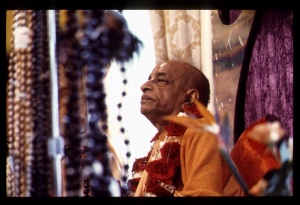UK/BG 10.17

TEXT 17
- катгам̇ відйа̄м ахам̇ йоґім̇с
- тва̄м̇ сада̄ парічінтайан;
- кешу кешу ча бга̄вешу
- чінтйо ’сі бгаґаван майа̄
Послівний переклад
катгам — як; відйа̄м ахам — я пізнаю; йоґін — о вищий містику; тва̄м—Тебе; сада̄—завжди; парічінтайан—думаючи про; кешу—в яких; кешу—в яких; ча—також; бга̄вешу—образах; чінтйах̣ асі—належить пам’ятати Тебе; бгаґаван—о Всевишній; майа̄—мною.
Переклад
О Кр̣шн̣а, о вищий містику, як мені постійно думати про Тебе, і як мені пізнати Тебе? В якій з Твоїх різноманітних форм мені пам’ятати про Тебе, о Верховний Боже-Особистість?
Коментар
As it is stated in the previous chapter, the Supreme Personality of Godhead is covered by His yoga-māyā. Only surrendered souls and devotees can see Him. Now Arjuna is convinced that his friend, Kṛṣṇa, is the Supreme Godhead, but he wants to know the general process by which the all-pervading Lord can be understood by the common man. Common men, including the demons and atheists, cannot know Kṛṣṇa, because He is guarded by His yoga-māyā energy. Again, these questions are asked by Arjuna for their benefit. The superior devotee is concerned not only for his own understanding but for the understanding of all mankind. So Arjuna, out of his mercy, because he is a Vaiṣṇava, a devotee, is opening for the common man the understanding of the all-pervasiveness of the Supreme Lord. He addresses Kṛṣṇa specifically as yogin because Śrī Kṛṣṇa is the master of the yoga-māyā energy, by which He is covered and uncovered to the common man. The common man who has no love for Kṛṣṇa cannot always think of Kṛṣṇa; therefore he has to think materially. Arjuna is considering the mode of thinking of the materialistic persons of this world. The words keṣu keṣu ca bhāveṣu refer to material nature (the word bhāva means “physical things”). Because materialists cannot understand Kṛṣṇa spiritually, they are advised to concentrate the mind on physical things and try to see how Kṛṣṇa is manifested by physical representations.